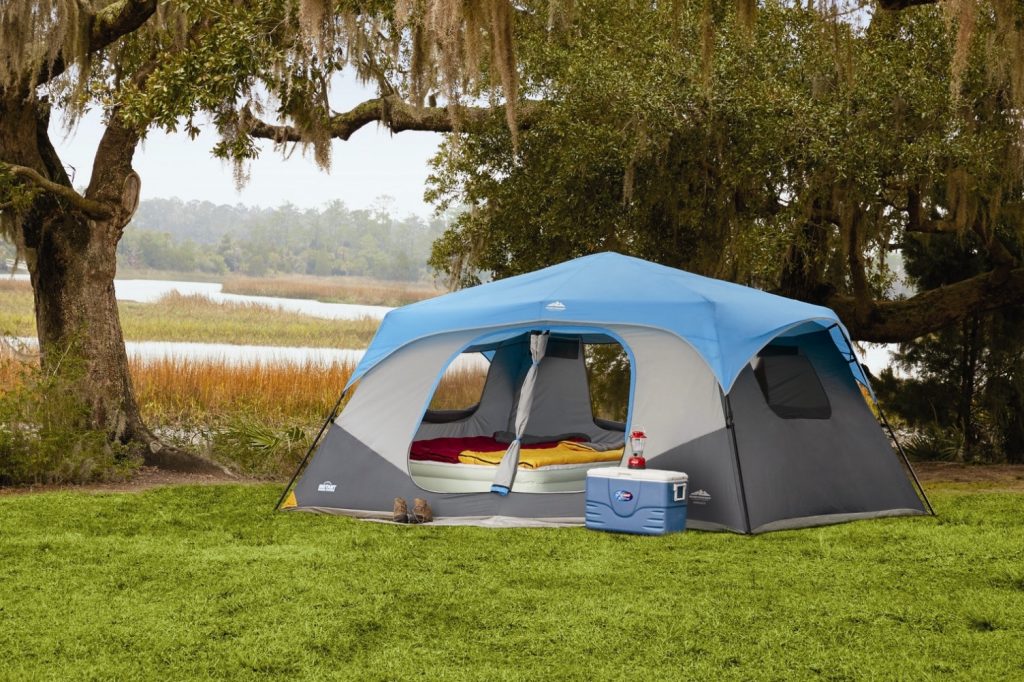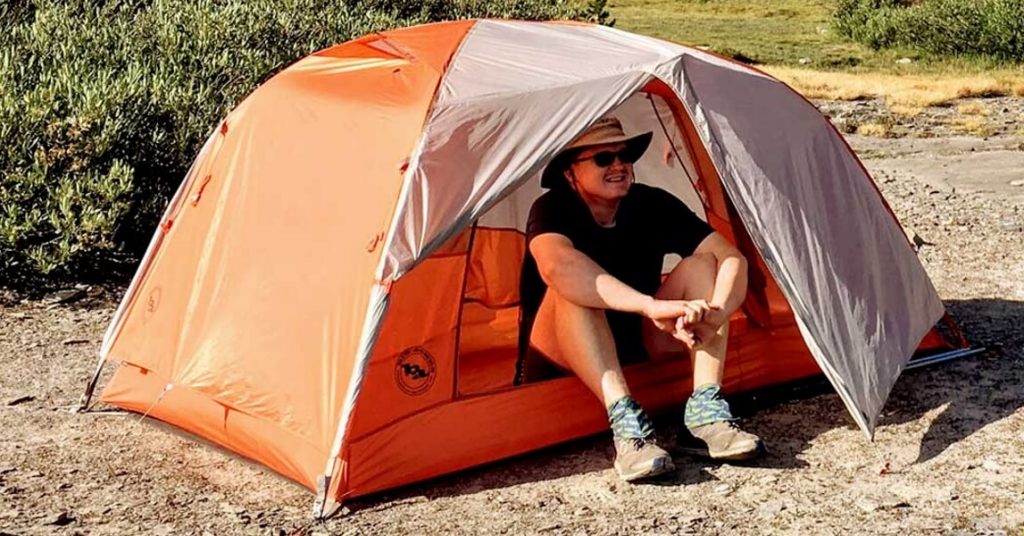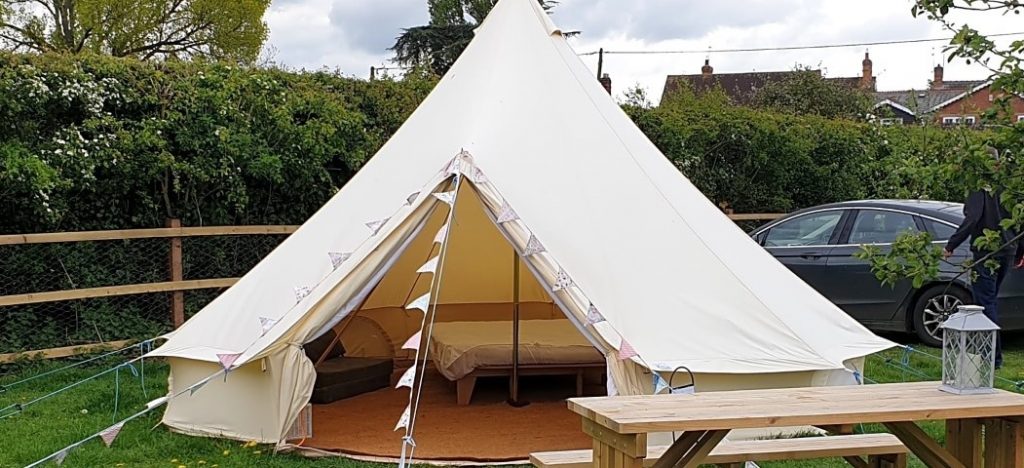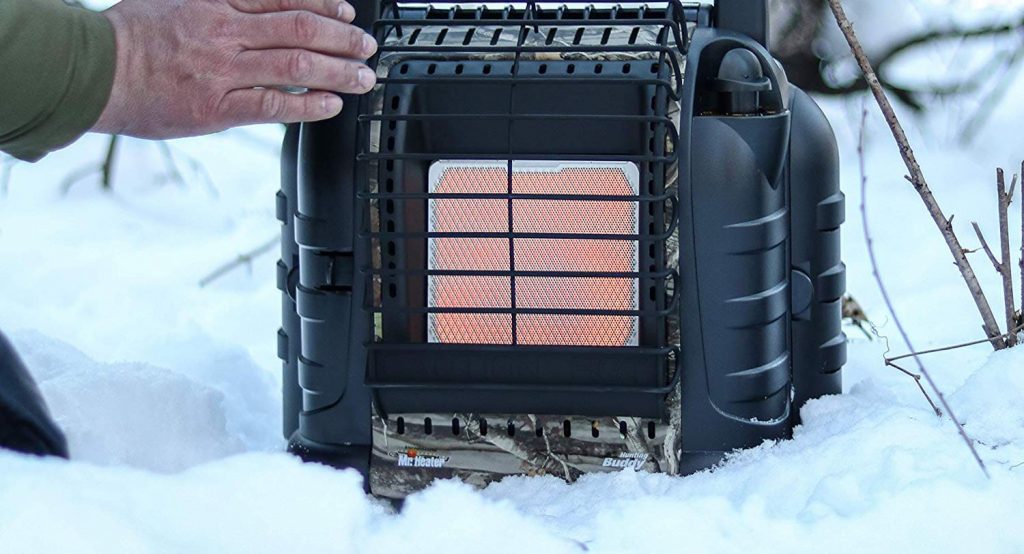

Choosing the best cold weather tent can be a challenge. You will not only have to think about the space required and quality of the tent, you’ll also need to consider where you are traveling and the possible weather challenges. You must match your traveling experience with the right type of tent.
Most cold weather tents excel at providing shelter against the harsh weather conditions, but you may want to look for a tent that offers greater wind resistance or has greater durability against heavy snows.
In our reviews, we’ve considered different parameters such as types of tents, base sizes, center heights, weight, waterproof ratings and occupancy. Each of these factors will influence your choice of cold weather tent for your outdoor adventures.
Our team has created a list of some of the best cold weather tents on the market. Our researchers have not only looked at the features of each tent, but also user feedback and manufacturer information. This data has allowed us to compile detailed reviews and a buying guide to help you make your informed purchase decision.
More features: lightweight, easy to set up, snow skirt, UV resistant, double layer tent, two doors, double mesh window
The GeerTop TopRoad 2Plus is a 4 season tent made with high quality materials. The anti-tear polyester is extremely lightweight, fully rainproof and has excellent UV resistance. This slippery surface means that snow and rain can be quickly shed. However, what is really innovative about this tent is the two double layers. The inner and outer tent superpose as a windproof tent, making it one of the best tents for cold weather. In warmer weather, you can use the inner layer alone for greater ventilation.
Another attractive feature of the GeerTop is that it offers quick and easy set up. Set up requires only a few minutes with one person. In addition, with this tent you also get lightweight portable case. This makes this tent easy to carry in a backpack.
This tent provides ample room for two adults. It is ideal for camping, hiking or climbing in spring, summer, fall or winter. It always keeps you warm and dry in the coldest snow, hardest rain or strongest winds.
More features: durable and high quality, 3 feet vestibule with windows and ventilation, double layer tent, flexible mesh window
The 3 person MoKo tent is an inexpensive option for any small family. The set-up is quite straightforward even for a novice camper. There is simply three poles that slide into color coded sleeves. The tent has a waterproof rainfly, which handles water and UV well. Furthermore, there is a back window for extra circulation. The floor is equipped with a 5000 millimeter waterproof polyethylene for additional water protection.
The tent vestibule can provide plenty space for storing extra gear and your shoes while two of you may comfortably rest in the main area. Unfortunately, it’s not really comfortable for three person to sleep at the same time, but there should be sufficient space for young families.
Another attractive feature of the MoKo tent is that it is lightweight – just under 7 pounds. This makes the tent easy to carry in a backpack or place in your car trunk.
The MoKo tent is suitable for all four seasons, providing a budget friendly option for couples or small families looking to get into camping throughout the year.
More features: lightweight, 2 internal aluminum poles for easy setup, 2 zippered vents, ToddTex single-wall fabric. Perfect any purpose: mountaineering, skiing, backpacking
The Black Diamond Eldorado is a fantastic for all around use. While it is excellent for summertime, it is also one of the best extreme cold weather tents on the market. The sturdy three layer membrane of ToddTex ePTFE fabric is more durable than the polyurethane coated fabrics that is commonly used for the typical single wall tent.
Compared to the most compact and lightest bivy style tents and bags, the Eldorado provides excellent durability, interior space and storm-proofing. This makes the Eldorado a great alpine tent in the lower 48 with possibilities for Alaskan, Himalyan and Andes adventures.
The Eldorado is not as versatile as some of the multi-season tents we’ve listed here, so you may not want to use it year round. However, it offers an excellent blend of lightweight, durability and comfort for most campers.
The classic mountaineering design even provides extra room to accommodate extra gear or taller campers. There is a single door entry with optional vestibule, hooded door vent and 2 zippered peak vents for air circulation.
More features: double layered tent, high-low ventilation, two vestibules
The Luxe Tempo is a great easy-to-set-up tent, perfect for your year round outdoor adventures. The freestanding, fixed pole system has one continuous pole with sections joined with shock cord. Making the set up process simple even for novice campers.
The Luxe Tempo features two doors, which means that you won’t need to climb over your sleep partner if you need to head out in the night for a comfort break. The two vestibules provide spacious storage zone, you can also set your opening door as a canopy for extra space, cool breezes and shade.
The 210T coated Rip Stop polyester is breathable to keep you feeling comfortable while providing plenty of space for two people with gear. The rainfly offers extremely effective waterproof qualities, working well even against horizontal rain.
The packed weight of the Luxe Tempo is close to 6 pounds, a little heavy to be classified as lightweight, but the features and 4 season capabilities makes those extra pounds worth it.
More features: one door, 3 vents, aluminum poles, waterproof polyurethane coating
The Snugpak Scorpion is a reliable, freestanding cold weather tent with an impressive waterproof rating and top quality aluminum poles. This is a fly-first-pitched tent, so the outer tent is separated from an inner tent, requiring a two-step pitching set-up. However, the process is quite fast – first, the color coded poles are inserted; next, the inner tent is attached with plastic buckles.
The Snugpak Scorpion has a single point front entry, with a porch space that is suitable for storing bags or equipment. Inside, there is generous space for three people, with mesh internal pockets to keep everything organized.
The PU coated flysheet is more durable than a typical tent so it is one of the best cold weather tent options. The material quality is really high, it has robust seams to ensure reliability. The interior is lined with a mesh to keep mosquitos out, while the sealable porch provides a secure space for your gear.
More features: two doors, four windows, frame: steel tubing, two funnel-flow vents, 1 pocket organizer, 1 bag organizer, 2 sewn in pockets
The Kodiak Canvas Flex Bow is an excellent option for those who like a little space when they camp. The heavy duty floor is hole resistant with joined seams to prevent leaks. Set up is super easy, with only a few minutes needed to assemble. The six foot high roof and steep walls provides a substantial inner space where you can walk around with no trouble.
The Canvas Flex Bow features two doors and four windows with a fine ventilation system to keep fresh air circulating. The vents and inside windows feature the impressive no-see-um screen to keep bugs out.
The large canopy provides a concealed entrance and shade to make the most use of your camp. The tent is supplied with a carry bag, but it is rather tight so you will need to be more persistent to get all the components into the bag when you are breaking the camp.
More features: easy to set up, snow skirt, aluminum poles, UV resistant, two doors
The Flytop is an excellent 4-season tent with snow skirt. This makes it a fantastic tent for winter camping. The double layer design aims to keep campers comfortable in cold weather, with double stitched seams, waterproofing, anti-rain technology and stitch tapings to ensure that you stay dry even in heavy rain.
The Flytop also has storage pockets to help you stow your gear and stay organized. There are dual doors to allow you to leave the tent without disturbing your camping partner. There is also double vestibules to provide additional storage for backpacks and gear to create more room in the sleeping area.
Inside the tent, the double wall construction creates a warm temperature even in cold, snowy weather. However, there are also no-see-um panels to balance temperature and prevent bugs from disturbing your sleep.
Despite these impressive features, the set-up of the Flytop is quite simple. At first, you set two crossed poles. Then, the other poles can be positioned for the tent to stand freely.
More features: freestanding tent, two vestibules, two doors, resistant to UV rays polyester fly, storage pockets, aluminum poles.
There is no assembly frustrations with the ALPS Tasmanian four season tent series. Freestanding aluminum pole set up features weatherproof shock cord and is easy to assemble for a quick set up. The system uses snap over pole clips, so you can assemble the tent even when your hands and fingers are cold. The Tasmanian 3 Person also has exceptional weather protection with factory sealed seams, poly taffeta floor, vestibule pole supports and weatherproof fly buckles for fantastic functionality.
The ALPS Tasmanian tent also features easy entry with two doors and zippered mesh windows. There are multiple mesh storage pockets, a gear loft and an ample vestibule area of 21 square to ensure that you remain comfortable throughout your winter adventure. Despite these impressive dimensions, the tent has a total weight of 9 pounds and 4 ounces, making it light enough to be packed on any adventure.
With so many options on the market, getting the right tent can be a little tricky. You not only need to consider how many people will be camping, whether you’ll be keeping your bags in the tent or left in a vehicle, and whether you want to cook inside or outdoors, but also the climate. The best cold weather tent options provide flexibility to meet your camping needs in any conditions. So, here we’ll explore how you can choose the right tent for your adventures.
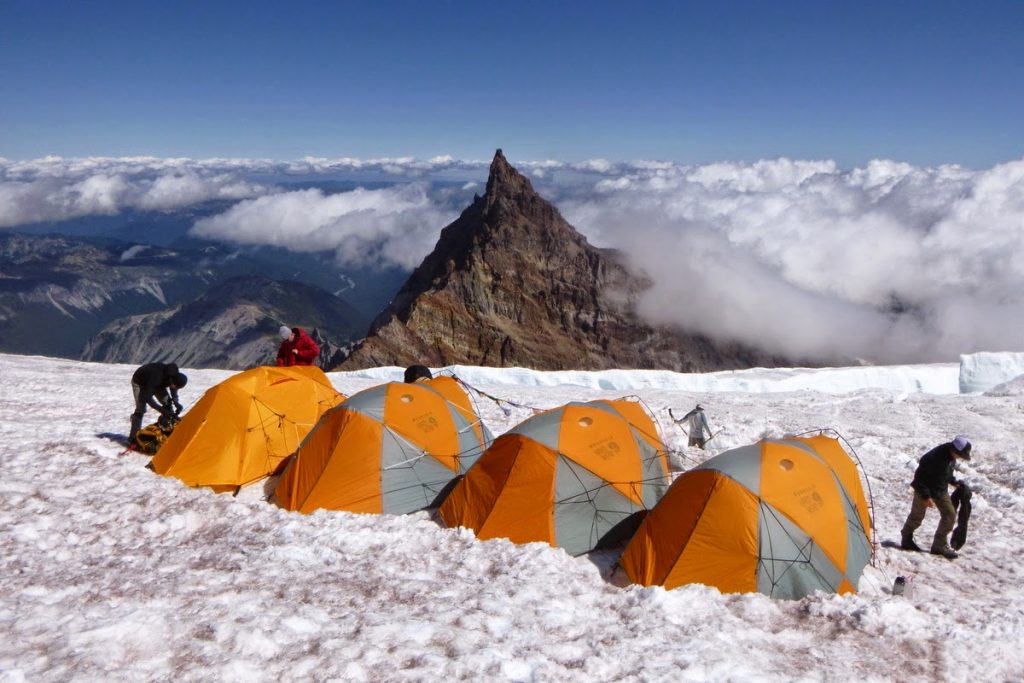
The first thing you need to consider is the actual weather. Not all cold weather tents are appropriate for snow. Snow can be more damaging for tents compared to rain and not all tents can hold up under the pressure.
If you’re planning a family trip, you’re not likely to head out in a blizzard, but if you’re backpacking in a snowy climate, you will need to look for enhanced durability.
You will also need to consider how long you’ll be camping. If you’re only out for a couple of nights, you may agree to pick smaller options, but on a longer trip you’ll need to choose a larger tent.
While there are numerous styles of tents, cold weather tents are separated into several categories.
Dome Tents:
Dome tent style is the most common. As the name suggests, the tent is shaped like a dome with two poles crossing and bending into the corners of the tent. On top of the poles, a rainfly is rested to provide added protection against the elements.
The main advantage of this type of tent is the ease of set up. Many models have color coded poles, so even novice campers can set up quickly. Dome tents have a relatively high center point for a decent amount of headspace and room, while the rounded edges encourage shedding of rain and water to prevent gathering up. Most dome tents feature a vestibule to act as a mudroom to keep wet, dirty gear out of the sleeping space and provide additional storage for backpacks and gear.
Geodesic Tents:
The geodesic tent is a progression of the dome tent with increased stability and support. The tent poles cross and intersect to create triangles and provide maximum stability from adverse weather.
Bow tent:
Bow tent is created with a frame for more sustainability compared to many other tent styles. On the other hand, it’s not really comfortable to carry and set-up, especially on rocky terrain.

You need enough vestibule space to put your gear inside (a tent heater, at least), enough floor space to lay your sleep pads and enough headspace to sit up, without excessive amounts of air that will need to be heated around you. Generally, cold weather tents tend to be a little snug, so if you are planning to camp as a couple, you may be better looking for a 3 person tent that will offer a little more space.
Due to the stronger materials needed to resist the harsh winter conditions, cold weather tents do tend to weigh more than 3 season tents. When planning a backpacking, alpine or mountaineering expedition, keeping things light may be a higher priority than livability and comfort, so it is crucial to look at the weight of a tent. Remember that everything you will carry on a winter trip will be more than a summer expedition, as you’ll need more layers, a warmer sleep pad, thicker sleeping bag, more fuel and more food.
However, if your winter camp will be set up straight from your car, the weight and portability of your tent will be a lesser issue.
Setting up a tent can be the most frustrating aspect of a camping trip, but this can be even more challenging in cold conditions. Therefore, it is important to consider the ease of set-up when making your purchase decision. Most dome style tents offer great ease of set-up, but if you are relatively new to camping or struggle with set-up, look for tents with color coded poles or other features that make setting process even easier.
Another thing to consider is that whether a tent can be set-up by one person. A tent that can be set-up by one person in a few minutes is obviously easier to use than one that requires a team effort.

There are a number of signs that can indicate good quality and durability. Look at seams, zippers and poles to check for quality. All of the examples, we’ve listed above have been tested for durability and there are very few negative comments. For example, the Kodiaq Flex has joined seams to prevent leaks.
As we’ve discussed above, cold weather tents require heavier and more durable materials to cope with the harsher weather conditions. The fabric of a 4 season or cold weather tent needs to be stronger than a 3 season tent. The thickness is typically measured in Denier with an annotation of D. The higher the number, the thicker the material.
Tent fly materials should have a durable water repellent, so that water could slides off to prevent water collecting and weighing down the tent fly. This coating is often silicone impregnated materials, polyurethane (PU) or PTFE, a non-toxic waterproofing membrane.
Another important consideration when shopping for the best cold weather tent is whether it offers resistance against the elements. Some tents are designed to offer efficient wind resistance, while others are better at resisting snowfall. Not all tents can offer all round resistance, so you should choose your tent according to the climate where you’ll be camping. For example, the Flytop has been designed to offer greater snow resistance, with a snow skirt to prevent snow buildup, while the Snugpack Scorpion offers impressive wind resistance. However, all cold weather tents should offer UV resistance, as snow can reflect the sun and cause problems even in colder conditions.
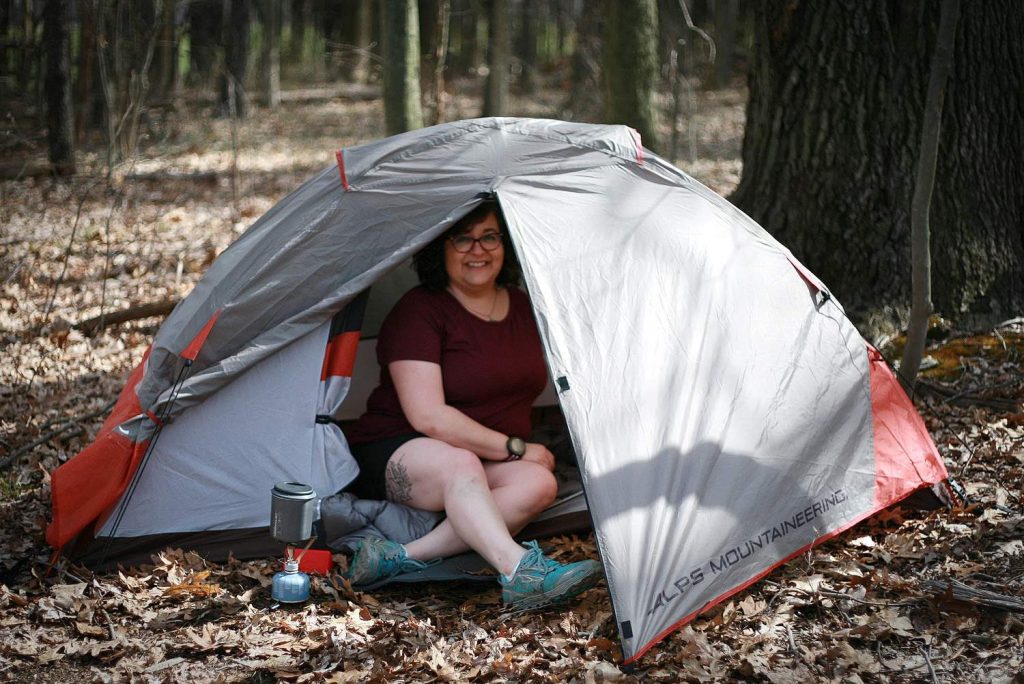
A vestibule: This can be really crucial to store your outer wear and save you from dumping the main part of the tent. This will help to prevent internal frosting and buildup because of condensation.
Ventilation: Although it may seem counterintuitive to let the cold air into your tent, good ventilation is essential to avoid condensation and internal frosting issues. Generally, a double wall tent will offer better ventilation, but some models also have additional vents.
Storage: Storage is handy in any tent, but in cold weather you need to keep your hat, gloves and other gear closer to you.
Two Entrances: If possible having a second entrance is a great feature in a cold weather tent. This means you can avoid climbing over your camping buddy if you need to leave the tent.
While 3 season tents are designed to be a lightweight shelter for the temperate conditions of spring, summer and fall, a 4 season tent is designed to also handle everything else. When properly pitched, a 3 season tents may be able to withstand light snow and stormy rain, they are not the best option for sustained exposure to harsh winter weather.
Generally, 4 season tents are only used in winter. In order to cope with the harsh conditions, 4 season tents tend to be heavier than a 3 season tent. The rainfly is usually extended to the ground to block wind, and the frame designs tend to be more robust and thicker to improve the strength of the walls. While 3 season tents are considered as a backpacking tents, 4 season tents are considered as an extreme weather tent.
Just like 3 season tents, cold weather tents can vary greatly in cost. The price range starts from budget friendly options, like the Moko, to extremely costly options. Obviously, if you’re planning a short break in winter, you’re not likely to need to go to the expense of an Everest expedition, but it is worth paying a little extra to ensure that your cold weather tent offers the functionality and features to allow you to enjoy your adventure.
While all of the tents we’ve listed offer excellent options for a cold weather tent, there are a few standout models. The GeerTop winter tent is our top pick for its double-layered design with inner tent, gear loft and snow skirt feature. Moreover, it offers two vestibules with additional storage and comfort. The MoKo family camping tent is great for its fast setup and affordability. However, the stand out as the best extreme cold weather tent has to be the Black Diamond Eldorado, which has a classic mountaineering design with the additional room to accommodate extra gear storage or taller campers. While the tent has a single-door entry, there is an optional vestibule and spacious layout is very appealing for any winter adventure.
